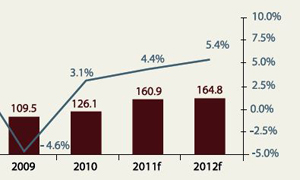EIU Expects Kuwait to Grow in 2011
Kuwait`s real GDP growth is about to accelerate and reach 4.4% in 2011.

According to the latest EIU report, Kuwait‘s real GDP growth is expected to grow by 4.4% this year as oil production picks up to fill the gap left by cuts in Libyan production. This is an improvement relative to 2010 when the Kuwaiti economy grew by 3.1%. It is worth noting that the latest International Energy Agency data show that output rose by 8.7% between January and July. Growth in oil production is projected to continue in 2012 and beyond as Kuwait starts to produce close to capacity and as new fields come on stream.
This is an improvement relative to 2010 when the Kuwaiti economy grew by 3.1%. It is worth noting that the latest International Energy Agency data show that output rose by 8.7% between January and July.
Kuwait’s government spending increased by 44% year-on-year in 2010-11 (April-March), while revenue grew by 21.6%, owing in large part to higher oil production and prices, according to the EIU. The budget surplus reached KD 5.3 billion, or an estimated 14.6% of GDP in 2010-11. In the medium term, Kuwait’s fiscal policy is expected to remain expansionary; the 2011-12 budget foresees expenditures of KD 19.4 billion, an 11% rise relative to last year’s budget. Capital expenditure is set to pick up, given the urgent need for infrastructure improvement and in order to meet the ambitious development goals outlined in the five-year plan. Current expenditure is also set to increase steadily as the government wage bill rises and as payments are made to the social security funds. Oil would continue to account for the bulk of budget revenue, as no new income or sales taxes are expected.
The EIU indicated that the inflation rate reached an average of 5.2% in January-June, but that high food prices would continue to exert upward pressure throughout 2011. The emir’s recent decision to increase direct transfers to citizens would contribute to add inflationary pressures in the economy. However, the emir has also pledged to make essential food items free up to March 2012. The government’s extensive subsidy system would prevent higher inflation in the future, as would more cautious credit growth and lower regional liquidity than in 2005-2008, as per the report. Therefore, the EIU expects inflation to average 5.6% this calendar year.
Finally, the report noted that Kuwait’s current-account surplus reached US$ 36.8 billion, or 29.2% of GDP, in 2010. Kuwait is expected to keep on having large current account surpluses in 2011-15 but their share of GDP would fall as import demand picks up and oil prices fall from 2012. It is worth noting that oil export earnings would continue to account for the bulk of export revenue in the coming years.
Sources: EIU, Bank Audi’s Group Research Department
The article above has been published as a part of Bank Audi`s MENA Weekly Monitor of Week 38 (2011). It can be accessed via Internet at the following web address: http://www.banqueaudi.com